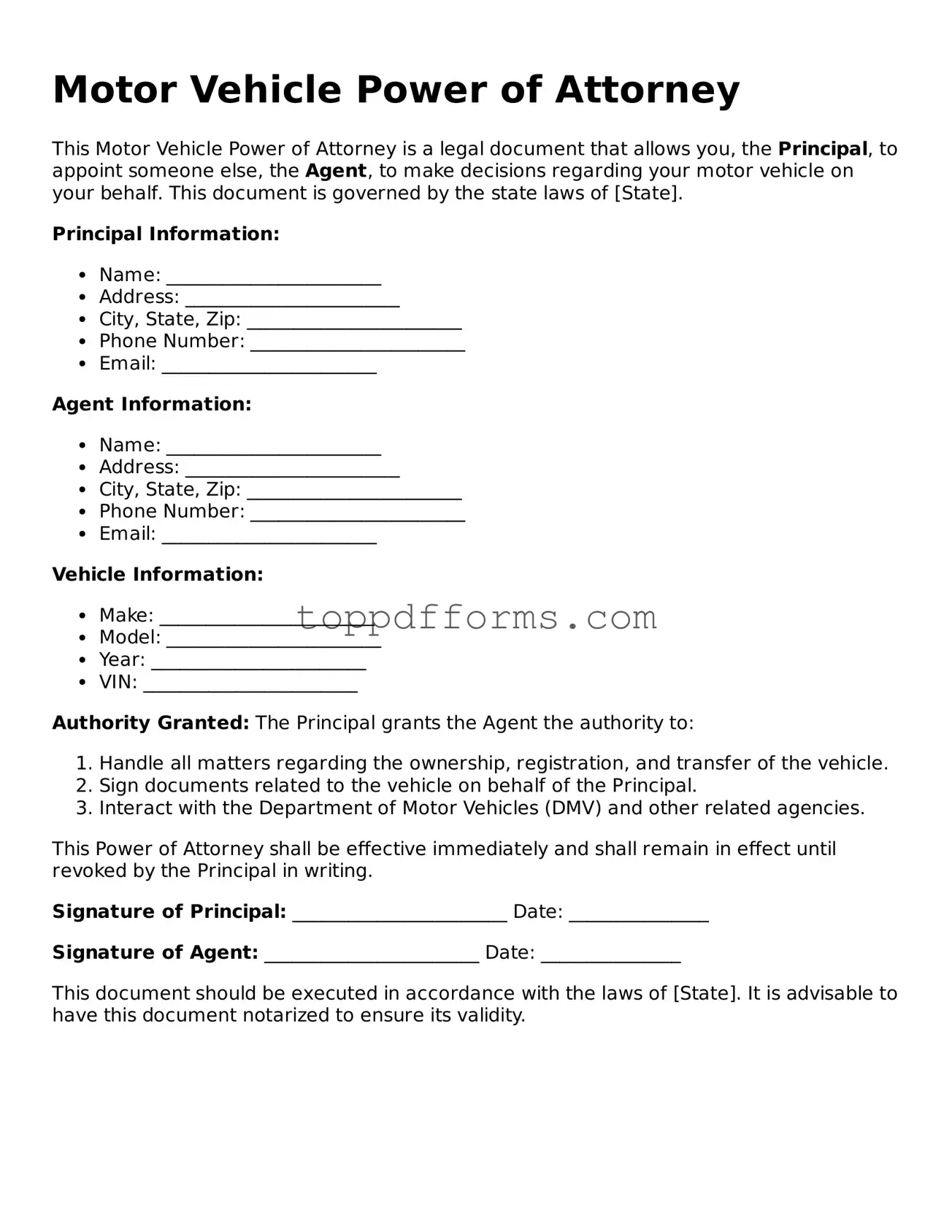Free Motor Vehicle Power of Attorney Template
State-specific Guidelines for Motor Vehicle Power of Attorney Documents
Things You Should Know About This Form
What is a Motor Vehicle Power of Attorney form?
A Motor Vehicle Power of Attorney form is a legal document that allows one person to authorize another person to act on their behalf regarding matters related to a motor vehicle. This can include tasks such as transferring ownership, registering a vehicle, or handling title issues. It’s useful when the vehicle owner cannot be present to complete these tasks themselves.
Who should consider using this form?
Anyone who owns a vehicle and may need to delegate authority for vehicle-related transactions should consider using this form. For example, if you are selling your car but cannot be there in person, you can appoint someone you trust to handle the sale on your behalf. This form is especially helpful for individuals who are out of state or have health issues that prevent them from managing their vehicle affairs.
How do I fill out the Motor Vehicle Power of Attorney form?
Filling out the form is straightforward. Start by providing your information as the vehicle owner, including your name and address. Next, include the details of the person you are appointing as your attorney-in-fact, along with their contact information. You will also need to describe the specific powers you are granting them, such as selling the vehicle or transferring the title. Finally, sign and date the form, and have it notarized if required by your state.
Is the Motor Vehicle Power of Attorney form valid in all states?
While the Motor Vehicle Power of Attorney form is widely recognized, its validity can vary by state. Some states have specific requirements for the form to be legally binding, such as notarization or specific language. It’s important to check your state’s regulations to ensure that your form meets all necessary criteria. Consulting with a local legal expert can also provide guidance tailored to your situation.
PDF Overview
| Fact Name | Description |
|---|---|
| Definition | A Motor Vehicle Power of Attorney form allows an individual to designate another person to act on their behalf regarding vehicle-related matters. |
| Purpose | This form is commonly used for tasks such as title transfers, registration, and obtaining duplicate titles. |
| State-Specific Forms | Each state may have its own version of the Motor Vehicle Power of Attorney form, tailored to local laws. |
| Governing Law | In California, for example, the governing law is the California Vehicle Code Section 5602. |
| Signature Requirement | The principal (the person granting power) must sign the form to make it valid. |
| Notarization | Some states require the form to be notarized for it to be legally binding. |
| Duration | The authority granted can be limited to a specific transaction or can be ongoing until revoked. |
| Revocation | The principal can revoke the Power of Attorney at any time, provided they notify the agent and any relevant parties. |
| Agent Responsibilities | The agent must act in the best interest of the principal and follow any specific instructions provided. |
| Common Uses | This form is frequently used in situations where the principal cannot be present, such as military service or relocation. |
Common mistakes
Filling out a Motor Vehicle Power of Attorney form can seem straightforward, but many people make common mistakes that can lead to complications. One frequent error is not providing complete information. Each section of the form is important. Missing details, such as the full name or address of the principal or the agent, can render the document invalid.
Another mistake involves the signatures. Some individuals forget to sign the form altogether. Others may sign in the wrong place or fail to have the signatures notarized when required. This oversight can delay the process of transferring vehicle ownership or handling other related matters.
People often overlook the specific powers granted in the form. It’s crucial to clearly outline what authority the agent has. Vague language can lead to misunderstandings. Without precise terms, the agent might not have the ability to act as intended, which can cause frustration and legal issues down the line.
Failing to date the form is another common error. A date provides clarity about when the authority begins. Without it, there may be confusion regarding the validity of the document. This can complicate matters if there are disputes about when the agent was authorized to act.
Some individuals do not review the form for accuracy before submission. Typos or incorrect information can create significant problems. It is essential to double-check all entries to ensure they are correct. A simple mistake can lead to delays or even legal challenges.
Another mistake people make is not considering state-specific requirements. Different states may have unique rules regarding the Motor Vehicle Power of Attorney. Failing to comply with these regulations can result in the form being rejected or not recognized.
Lastly, many people forget to keep copies of the completed form. Having a copy is vital for both the principal and the agent. It ensures that both parties have access to the same information and can refer back to the document if questions arise.
Different Types of Motor Vehicle Power of Attorney Templates:
Sample Power of Attorney for Property - Legally authorize someone to act in your best interest regarding your property.
To facilitate the process of property transfer, utilizing a Texas Quitclaim Deed can be an efficient approach, especially when dealing with familiar relationships or uncertain title conditions. For those looking to find reliable resources or templates for this legal form, visit PDF Templates to ensure you have the necessary documentation for a seamless transaction.
Power of Attorney Form California - A signed Durable Power of Attorney is effective until revoked or upon your death.
